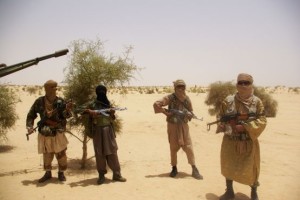
 The early warnings expressed years ago about the serious threat weighing on the whole Sahel-Sahara region because of extremism and terrorism went unfortunately unheeded.
The early warnings expressed years ago about the serious threat weighing on the whole Sahel-Sahara region because of extremism and terrorism went unfortunately unheeded.Some countries, including the United States and Morocco, and some pundits have sounded the alarm many years ago as to the danger of the militant Islamist groups, roaming in the Sahara desert, on the entire region of the Maghreb, the Sahara and the Sahel. The danger further increased after the arsenal of former Libyan ruler Moammar Kaddafi was looted by mercenaries and huge quantities of weapons were smuggled out of Libya to feed Jihadist networks stretching across North Africa, become, as pointed by some analysts, al-Qaeda’s new center of gravity.
The expanding presence of al-Qaeda in northern Africa and the Libyan arms influx have fuelled the crisis in Mali and created an “Arc of Instability” that stretches from the coast of West Africa across the Sahel region into the Horn of Africa.
“The situation in Mali remains a veritable powder keg,” and northern Mali has become the “largest al-Qaeda stronghold since the fall of Afghanistan in 2001,” said NATO Allied Command Civil-Military Fusion Centre (CFC) and Navy CNA Strategic Studies in studies published last December.
This arc of instability across Africa poses an acute threat to countries in the region as well as to Europe and the US.
So, it is no surprise that the 12th Organization of Islamic Cooperation summit meeting, held in Cairo February 6-7, has devoted a large debate to the situation in Mali and to the scourge of terrorism and that leaders addressing the gathering spoke of this issue in their speeches and remarks.
“Once again, I wish to condemn all terrorist acts that are based on excommunication and exclusion, or that seek to sow the seeds of discord,” said the King of Morocco in a speech before the summit.
In the speech that was read out on his behalf by his country’s Prime Minister, the King recalled that Morocco warned the international community of the perils looming over the Sahel and Sahara region years ago and that Mali has recently experienced some of “the worst manifestations of extremism, terrorism and separatism.”
“The threat and its implications extend beyond the borders of the sister nation Mali to all countries in the region, and the aim is to destabilize them and undermine their unity,” he said underscoring that as the problem is a general one, “it calls for a comprehensive solution within the framework of international legitimacy – a solution that builds on resolute, consistent and coherent international efforts and on the use of all means of prevention and support, both from the political and security perspective.”
Renewing Morocco’s solidarity with the countries of the Sahel and Sahara region, he denounced “all forms of terrorism committed, allegedly, in the name of Islam, a faith which does not condone any deliberate aggression against people or the things they hold sacred.”
King Mohammed VI particularly deplored the destruction by the armed radical groups of what he called “the symbols of the cultural heritage of that country, especially in Timbuktu, the spiritual capital of Mali”, alluding to the destruction during the 2012 summer of mosques and tombs of ancient Muslim saints in the fabled city, known as the “City of 333 Saints” and as one of the most ancient seats of Islamic civilization.
Decrying these attempts to impose obscurantist ideology and undermine the Islamic values to which the Malian people have been committed since time immemorial, Morocco’s king, who was echoed by other attending Islamic leaders, said “These violent practices are simply incompatible with the tolerant values of Islam.”
The king also lauded the Security Council response to Mali’s appeal and described its decision to support Mali in its efforts to preserve its unity and sovereignty as “right”.
Last December, the Security Council, then chaired by Morocco, adopted a resolution sanctioning deployment of the African forces in Mali.
Morocco was also the first country to send a humanitarian assistance to the warn-torn country and pledged last week a contribution of $ 5 million to the Malians.
In his speech, the Moroccan king also hailed as “quick and effective” France’s intervention. In response to the emergency appeal made by the Malian authorities, French troops, supported by Malian and African forces, “intervened quickly and effectively,” he said.
Morocco has opened its air space, along with Algeria, to enable French jets to support the advance of French and Mali troops to Gao, Timbuktu, and Kidal.
“It was this firm reaction which made it possible to check the invasion of Southern Mali and to put an end to it. This was later followed by the liberation of Northern Mali, with its cities steeped in history, its Muslim populations and its religious monuments which attest to the Malian people’s longstanding adherence to Islam,” he said.
